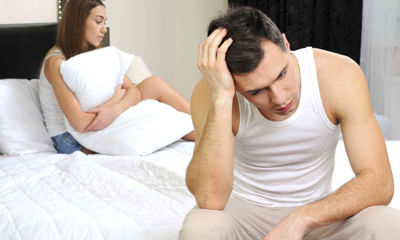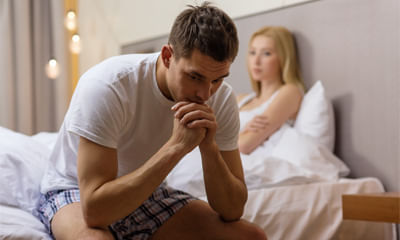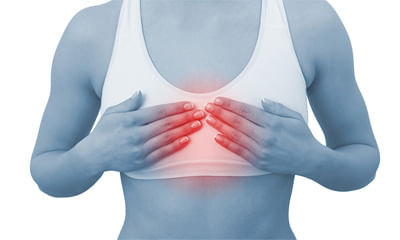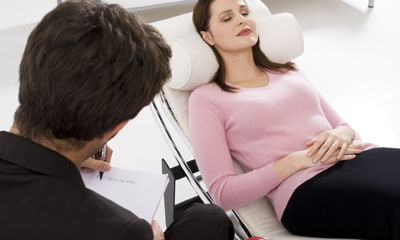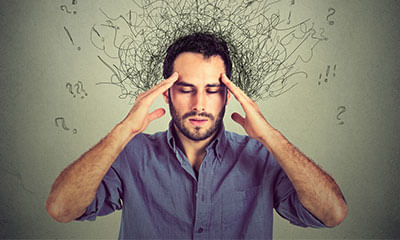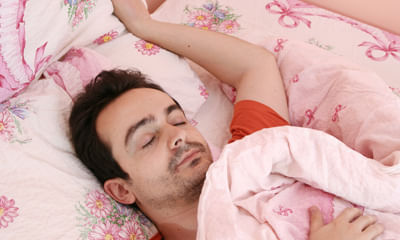Chest Pain When Excited
I am having the sex problem my penis not getting hard at the same time it is ejaculate very fastly so pls suggest me the ...
Ask Free Question
Hello dear Lybrate user, Warm welcome to Lybrate.com I have evaluated your query thoroughly. Here are some best working tips for your query. Do not opt for fake advertisements claiming capsules and tablets for penile strength, prolonging sex & making patients fool. Certain molecules which are having results are also not without side effects some of which are very serious as chest pain, heart rate disturbances or else ; so without consultation of urologist, not advisable to consume. Provide enough time in foreplay, after play. Consume plenty of liquids. Balanced nutritious diet intake with enough iron, vitamins,minerals, proteins.Regular walking in fresh air, exercises,relaxation techniques, YOGA help great in creating self confidence. Avoid stress, anxiety.Manage to have regular sound sleep of 8 hours. Cut off use of mobile, internet in bedroom. Discuss with the partner regarding her likes and dislikes with love. Keep your blood sugar, cholesterol levels, body weight under control. Avoid smoking, alcohol if consuming. Consider sex as an art rather than just act of finishing ejaculation. Plan sudden surprises as uninformed leave from job coming home, candle light dinner, surprise gift, outing,variations in sex acts which matters a lot. Consult later your urologist as per the requirement. Hope this clears your query. Wishing you best sex life ahead. Welcome for any further assistance. Regards take care.
My Bp gets to a higher side when I go emotionally disturbed. It gives me constant chest pain also during the fluctuation ...
Ask Free Question
Please understand that It is pretty normal for BP to rise in response to anger, stress, anxiety, fear, excitement etc and a rise in BP during such situations is not abnormal. In fact one of the most important part of keeping BP controlled is managing stress and anxiety. Your chest pain may also be a psychological response to your stress. But to re-assure yourself get a ecg, TMT and echo done, if they are normal and you only experience BP rise during stress situations, then please consult a psychiatrist for anxiety and emotional counselling and medical treatment and also do some meditation and yoga. Begin daily exercise for 30-40 mins, avoid smoking, alcohol and stimulants like caffeine and eat a healthy diet.
What happen when penis touches cervix what cause pain to women why women cry during sex. ...
Ask Free Question
Dear user. I can understand. Women can experience VAGINAL PAIN during or after sex, either in the vagina or deeper in the pelvis. Pain in the vagina could be caused by: an infection: thrush or a sexually transmitted infection (STI), such as chlamydia, gonorrhoea or genital herpes. Changing hormone levels can make your vagina dry. Lack of foreplay and other factors can make your vagina dry. All these factors could contribute to the pain. I suggest you to consult a gynecologist for physical investigation. Take care.
My partner complaints of pain during intercourse that's why we couldn't make it what to do. ...
Ask Free Question
Dyspareunia Dyspareunia is painful sexual intercourse due to medical or psychological causes. The pain can primarily be on the external surface of the genitalia, or deeper in the pelvis upon deep pressure against the cervix. It can affect a small portion of the vulva or vagina or be felt all over the surface. Understanding the duration, location, and nature of the pain is important in identifying the causes of the pain. Numerous physical, psychological, and social or relationship causes can contribute to pain during sexual encounters. Underlying causes determine treatment. Many women experience relief when physical causes are identified and treated. The treatment for pain with intercourse depends on what is causing the pain. After proper diagnosis one or more treatments for specific causes may be necessary. For pain due to yeast or fungal infections, a clinician may prescribe mycogen cream (nystatin and triamcinolone acetonide), which treats both a yeast infection and associated painful inflammation and itching because it contains both an antifungal and a steroid. For pain thought due to post-menopausal vaginal dryness, estrogen treatment can be used. For women with diagnostic criteria for endometriosis, medications or surgery are possible options. Lignocaine gel may be used in severe cases. In addition, the following may reduce discomfort with intercourse: Both of you Shave the pubic region regularly. Also, add pleasant, sexually exciting experiences to your regular interactions, such as bathing together (in which the primary goal is not cleanliness), or mutual caressing without intercourse. In couples where a woman is preparing to receive vaginal intercourse, such activities tend to increase both natural lubrication and vaginal dilation, both of which decrease friction and pain. Prior to intercourse, oral sex may relax and lubricate the vagina. Apply water-soluble sexual or surgical lubricant during intercourse. Discourage petroleum jelly. Lubricant should be liberally applied (two tablespoons full) to both the penis and the orifice. A folded bath towel under the receiving partner's hips helps prevent spillage on bedclothes. Ask your partner to control the insertion by her hand. For those who have pain on deep penetration because of pelvic injury or disease, recommend a change in coital position to one with less penetration. In women receiving vaginal penetration: maximum vaginal penetration is achieved when the receiving woman lies on her back with her pelvis rolled up off the bed, compressing her thighs tightly against her chest with her calves over the penetrating partner's shoulders. Minimal penetration occurs when a receiving woman lies on her back with her legs extended flat on the bed and close together while her partner's legs straddle hers.
I had echo ecg tmt chest x-ray which came out to be normal but still I get frequent chest pains. And whenever this pain ...
Ask Free Question
You can surely get heart disease. And so anybody else. Including even the doctors, even me. If it happens go for its management. That's all. No need to worry of impending death always. Birth always happen to end up in death only. So what is more important is to make the most of each moment in your life. Cheer up. Be happy. Get excited. Run out into the wilderness or to the flow of people out there on the streets. Enjoy life to its fullest. Warm regards.
I sometimes feel lost, frustrated, unhappy, sad, negative for no reason. My life is becoming aimless though I have every ...
Ask Free Question
Suffering unwanted anxiety is very much prevalent nowadays! It is common complaint that" I Suffer from anxiety. Please help me" Anxiety is a very normal emotion, which gives rise to feelings of nervousness every now and then. An anxiety disorder is a serious medical condition in which people experience a high degree of distress and mental trauma, which hinders a normal life. People suffering from this medical condition experience high levels of anxiety and nervousness almost all the time. Here are the cardinal symptoms that indicate you're suffering from anxiety disorder. 1. Troublesome & Excess worry - This condition prevails if you worry about the day to day activities too much on a regular basis. It is identified when you start taking too much stress about very common and routine things, related to life or work which tends to affect you in an adverse way. A noticeable sign of excessive worry can be too much fatigue. 2. Lack of Sleep/irregular, disturbed sleep - Problems in falling asleep at the right time and problems in maintaining an uninterrupted sleep are two signs that indicate you have an anxiety disorder. 3. Baseless / Irrational fears - This symptom is not generalized; instead, it is specific and subjective in relation to a particular thing or situation. The fears that are experienced under this category are sudden and unexpected in nature and there is no fixed rationale behind these fears. One may ear of death or accident or fall from a plane and so on. 4. Muscle pain - Muscle discomfort and pain is one of the leading physiological causes of an anxiety disorder. The pain felt is chronic and pervasive, and is very common among people facing situations of anxiety. If you are exposed to constant periods of anxiety, you will experience fatigue, muscle pains and lethargy or unwillingness to work. 5. Unexplained indigestion - Problems related to the digestive system are also a sign of anxiety disorder. In this case, you may face constant digestive problems accompanied by a common disorder called IBS (Irritable Bowel Syndrome). IBS refers to an anxiety situation in the digestive tract, which is characterized by sudden urge to defecate on eating, stomach aches, cramping, bloating, gas, constipation, and/or diarrhoea. Apart from the above-mentioned symptoms, other symptoms of an anxiety disorder include stage fright, self- consciousness, panic attacks, memory flashbacks, perfectionism, compulsive behaviours, self- doubt, and such others. Symptoms vary depending on the type of anxiety disorder, but general symptoms include: • Feelings of panic, fear, and uneasiness. • Problems sleeping. • Cold or sweaty hands and/or feet. • Shortness of breath. • Heart palpitations. • An inability to be still and calm. • Dry mouth. • Numbness or tingling in the hands or feet. Anxiety is a normal, predictable part of life. However, people with an anxiety disorder are essentially phobic about anxiety feeling. And they’ll go to any lengths to avoid it. Some people experience generalized anxiety disorder (GAD), excessive anxiety about real-life concerns, such as money, relationships, health and academics, Others struggle with social anxiety, and worry about being evaluated or embarrassing themselves. People with obsessive compulsive disorder (OCD) might become preoccupied with symmetry or potential contamination. The bottom line is that people can experience anxiety, and anxiety disorders, related to just about anything. Most of these steps contribute to a healthy and fulfilling life, overall. To sum up, making some basic lifestyle changes can do wonders for someone coping with elevated anxiety. Take these steps from today. 1. Take a deep breath. Deep diaphragmatic breathing triggers our relaxation response, switching from our fight-or-flight response of the sympathetic nervous system, to the relaxed, balanced response of our parasympathetic nervous system, according to, clinical psychologists, who have suggested the following exercise, which you can repeat several times: #Inhale slowly to a count of four, starting at your belly and then moving into your chest. Gently hold your breath for four counts. Then slowly exhale to four counts. 2 Be active. One of the most important things one can do to cope with anxiety] is to get regular cardiovascular exercise,” For instance, a brisk 30- to 60-minute walk “releases endorphins that lead to a reduction in anxiety.” You can start today by taking a walk. Or create a list of physical activities that you enjoy, and put them on your schedule for the week. Other options include: running, rowing, rollerblading, hiking, biking, dancing, swimming, surfing, step aerobics, kickboxing and sports such as soccer, tennis and basketball, in short just anything you can do to be physically active 3. Sleep well. Not getting enough sleep can trigger anxiety. If you’re having trouble sleeping, tonight, engage in a relaxing activity before bedtime, such as taking a warm bath, listening to soothing music or taking several deep breaths and meditation is excellent .If you’re like many people with anxiety whose brains start buzzing right before bed, jot down your worries earlier in the day for 10 to 15 minutes, or try a mental exercise like thinking of fruits with the same letter. 4. Fight an anxious thought. We all have moments wherein we unintentionally increase or maintain our own worry by thinking unhelpful thoughts. These thoughts are often unrealistic, inaccurate, or, to some extent, unreasonable. Thankfully, we can change these thoughts. The first step is to identify them. Consider how a specific thought affects your feelings and behaviours. Is it helpful or unhelpful? These are the types of thoughts you want to challenge. Therefore it is suggested asking yourself: “Is this worry real?” “Is this going to happen?” “If the worst possible outcome happens, what would be so bad about that?” “Could I handle that?” “What might I do?” “If something bad happens, what might that mean to me?” “Is this really true or does it just seem so. Then, reframe or correct that thought to make it more accurate, realistic and more adaptive. For example: “I would feel embarrassed if I tripped on the stage, but that’s just a feeling; and it won't last forever, and I would get through it.” 5. Say an encouraging statement. Positive, accurate statements can help to put things into perspective. See these examples: “Anxiety is just a feeling, like any other feeling.” and “This feels bad, but I can use some strategies to cope with it.” 6. Stay connected to others. Social support is vital to managing stress, Today, call a loved one, schedule to go to lunch with a close friend. Talking with others can do a world of good. Another option is to get together and engage in an activity that improves your anxiety, such as taking a walk, sitting on the beach or going to a yoga class. 7. Avoid Alcohol and caffeine. Managing anxiety is as much about what you do as what you don’t do. And there are some substances that exacerbate anxiety. Caffeine/alcohol is one of those substances. The last thing people with anxiety need is a substance that makes them feel more turned on, which is exactly what caffeine/alcohol does. 8. Avoid mood changing drugs. “While drugs and alcohol might help to reduce anxiety in the short term, they often do just the opposite in the long term,” Even the short-term effect can be harmful. Experts have treated countless clients whose first panic attack occurred while they were taking drugs such as marijuana, ecstasy or LSD. “Panic attacks are bad enough if you are straight and sober, so imagine how bad they are if you are high, and can’t get untied until the drug wears off.” 9. Do something you enjoy. Engaging in enjoyable activities helps to soothe your anxiety. For instance, today, you might take a walk, listen to music or read a book, 10. Take a break. It’s also helpful to build breaks into your day. As it is said, this might be a “simple change of pace or scenery, enjoying a hobby, or switching ‘to-do’ tasks.” “Breaking from concerted effort can be refreshing.” 11. Solve Problem It is suggested considering how you can address the stressors that are causing your anxiety. Today, make a list of these stressors and next to each one, jot down one or two solutions. 12. Read a book. There are many valuable resources on anxiety, which teach you effective coping skills. Some recommended are Dying of Embarrassment for people with social anxiety; The BDD Workbook for body dysmorphic disorder; The Imp of the Mindand The OCD Workbook for obsessive-compulsive disorder. And It is suggested "Stop Obsessing" for adults with OCD (and Up and Down the Worry Hill for kids with OCD). For people with panic attacks, it is suggested Don’t Panic: Taking Control of Anxiety Attacks. For a general overview of cognitive-behavioural therapy for anxiety, 13. Engage in calming practices. “Meditation, yoga, or other calming practices can help minimize anxiety in both the short and long term.” Sign up for a yoga class or watch a yoga video online. Meditate right now for just three minutes and do for yoga 14. Consult a therapist. Sometimes anxiety can be difficult to manage without professional help, Many organizations include databases of providers who specialize in anxiety (along with helpful information). 15. Accept your anxiety. If you really want to effectively manage your anxiety, the key is to accept it, “This might sound strange. But anxiety, “in and of itself,” isn’t the real problem. Instead, it’s our attempts at controlling and eliminating it, not accepting these unwanted inner experiences is the actual source of self-induced suffering.” Accepting anxiety doesn’t mean “resigning" ourselves to a life of anxious misery. It simply means that we are better off recognizing and fully accepting the existence of anxiety and other uncomfortable emotional states that are inevitable, but transitory. So if you experience anxiety today, simply observe it. “Think of it like a wave of the ocean; allow it to come in, experience it, and ride it out.” Anxiety can feel overwhelming. It can feel like chains around your feet, weighing you down. But by taking small steps – like the ones above – you can minimize your anxiety and cope effectively. Have A peaceful life ahead YOu read by blog virtualdr/blogspot.in.
HELP NEEDED DESPERATELY My boyfriend, 18 years, is suffering since 9 months. These are the symptoms he describes. Differ ...
Ask Free Question
There is high possibility that there will be confusion and mixed diagnosis due to your age. This is the last stage in your adolescence and because of hormonal and unresolved childhood issues, these symptoms will arise seeking a resolution. The symptoms will settle down to a more defined diagnosis in a short while and treatment can be geared to facilitate the correct prescription. However, there is a strong possibility that there may be a genetic factor that is getting activated also because of your age. Check your family history with your parents and find out the predisposition to any pathology. That will indicate the type of pathology that will finally come up. In the meantime, combine counseling with the medication and you will do a lot better. Because you are young the prognosis can be very good if you are cooperative. People with mental illness lose contact with reality and are therefore not aware. The more aware you are, the more likely you are of being in sound mental health. Now there are two types or levels of awareness: the internal and the external. Both require equal important but not at the same time. At any given time one might require more than the other for practical reasons. It is important to learn to vacillate between the two in smooth harmony as per the demands of the situation. So if there are thoughts internally, then the external behavior must match and conform to what is going on internally. This synchronization is a hallmark of the quality of awareness. So you must always manifest that connection, and there will be no discrepancy to raise other peopleâs doubts or your own about your mental health. You must put yourself on a tight time schedule of interesting activities and be in the company of people. You must do vigorous and regular exercise, eat well, sleep adequately and work on your emotions, especially fear. The treatment will take as long time and will will work very well if you are cooperative.
I am experiencing poking pain on the heart side of chest. During sleep at nights I also feel head is over burdened. ...
Ask Free Question
Dear Lybrateuser, -Chest pain at your age could be due to hyperacidity, stress, anxiety or sedentary habit -avoid spicy, fried & junk food, have fresh homemade food, do not skip meals, keep your meal timings fixed, have 4-5 small meals including snacks rather than 3 large meals, have dinner 2-3 hrs before bedtime, do not lye down immediately after meals -have 7-8 glasses of water per day for proper digestion -take syrup Gelusil, 2 teaspoonful 20 min after every meal -do regular exercises like walking, jogging, swimming for 30 min, also do yoga & deep breathing exercises for 5-10 min in the morning to relieve stress & for good blood circulation -keep yourself relaxed as getting excited can lead to pain -also get your BP checked up, if not much relief then have to do investigations & consult a doctor.
I have asthma since last 3 years I didn't get any type of medicine to cure it Its really getting me full of pain please ...
Ask Free Question
Dear lybrate-user, kindly do a lung fuction test to confirm asthma and allergy skin test with a chest physcian, you can start releiver and preventer inhalers once asthma diagnosis is edtablished. Allergy immunothrapy if allergan test strongly positive, allergy avoidance as far as possible. Thankyou.
How frequent can one take erection enhancer pills (sildenafil 10mg)/viagra 10mg. Is it safe to hv 1 pill in a week? What ...
Ask Free Question
Common side effects of viagra headache, flushing in the face, neck, or chest, upset stomach, indigestion, abnormal vision, nasal congestion, back pain, muscular pain or tenderness. Nausea, dizziness, rash, diarrhea serious side effects of viagra change or loss of vision, ringing in ears or hearing loss, chest pain or irregular heartbeat, shortness of breath, lightheadedness, swelling in the hands, ankles, and feet. Message me in detail for treatment to find out the sexual disposition answer following -. Are you excited or is all excitement absent? are you able to get an erection but it fails? at what point does it fail? are erections completely absent? do you have a history of sexually transmitted diseases? is there a history of sexual excesses or masturbation? are there any physical changes since the erectile dysfunction? homeopathy help best to treat and cure erectile dysfunction.



